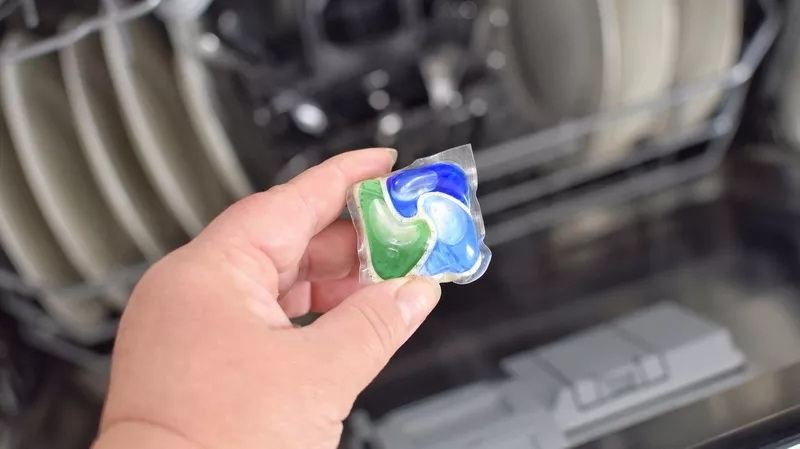Dongguan UFine Daily Chemical Co.,Ltd.
- All
- Product Name
- Product Keyword
- Product Model
- Product Summary
- Product Description
- Multi Field Search
Views: 222 Author: Tomorrow Publish Time: 11-18-2025 Origin: Site











Content Menu
>> Why HE Detergents Are Special
● What Are Dishwasher Pods and How Do They Work?
>> Ingredients in Dishwasher Pods
● Key Differences Between Dishwasher Pods and Laundry Detergents
● What Happens If You Use a Dishwasher Pod in an HE Washer?
>> 1. Ineffective Cleaning Performance
>> 2. Fabric Damage and Discoloration
>> 3. Residue Buildup in the Washer
>> 4. Risk to Machine Components
>> 5. Poor Rinsing and Skin Sensitivity
● Steps to Take If You Used a Dishwasher Pod by Mistake
● Can You Ever Cross-Use Detergents?
● Safe Alternatives for Special Cleaning Needs
● Environmental Considerations
● Common Misconceptions About Detergents
>> “Dishwasher pods can remove tough stains better.”
>> “Using one pod once won't hurt.”
>> “Both pods look similar, so they must be interchangeable.”
● Tips for Choosing the Right HE Laundry Detergent
● The Cost of Mistakes: Machine Warranty and Repairs
● FAQ
>> 1. What happens if I mistakenly use a dishwasher pod?
>> 2. Can I dissolve a dishwasher pod in water before using it in laundry?
>> 3. Are HE detergent pods better than liquid detergents?
>> 4. How can I identify HE-compatible detergent?
>> 5. Can dishwasher detergent damage an HE washer permanently?
In today's fast-paced world, many households rely on both dishwashers and washing machines to handle daily cleaning tasks efficiently. Each appliance uses specialized detergents designed for specific cleaning purposes. However, sometimes the line between them gets blurred, especially since both often come in similar-looking pods. This has led to a common question: Can I use a dishwasher pod in an HE washer?
While the idea might seem reasonable in an emergency, the short answer is no. Dishwasher pods are not safe for use in HE washing machines, and substituting one for laundry detergent can create unwanted chemical reactions, clothing damage, and even potential harm to your washer's internal components. To understand why, let's explore what makes these two types of detergent so different.

HE stands for “High Efficiency.” These machines are designed to clean clothes using significantly less water and energy compared to traditional top-load washers. They operate with a controlled amount of water and rely on concentrated, low-sudsing detergents to deliver effective results.
Unlike older washing machines that fill the entire drum with water, HE washers work by tumbling or rotating clothes through shallow pools of water mixed with concentrated detergent. This mechanical movement, rather than water volume, helps lift and remove soil from fabrics.
Because of this design, HE washers are sensitive to detergent type. Using a product that produces too much suds, clogs residue sensors, or fails to rinse properly can compromise wash quality or damage the machine over time.
HE detergents are formulated with advanced surfactants to fight stains and dirt in low-water conditions. They produce fewer bubbles, rinse easily, and prevent buildup inside the drum. Using non-HE detergents, including dish-specific ones, can result in over-sudsing, inefficient cleaning, and residue accumulation that encourages mold growth.
Dishwasher pods are pre-measured cleaning capsules that combine detergent, rinse aid, and sometimes water softeners in one compact form. They are intended for use in high-temperature dishwasher cycles that dissolve tough food residues and grease from glassware, metal utensils, and ceramic dishes.
A typical dishwasher pod may contain:
- Enzymes that break down proteins, starches, and fats from food particles.
- Oxygen-based bleaching agents like sodium percarbonate to remove stubborn stains.
- Alkaline compounds such as sodium carbonate to neutralize acids and cut through grease.
- Surfactants that remove debris at high heat with minimal foaming.
- Anti-scaling agents to prevent limescale buildup inside the dishwasher.
These powerful chemicals are optimized for dishwashing, not fabric care. They react best at high water temperatures exceeding 55°C—conditions rarely reached in laundry cycles.
Although both are cleaning products, their chemical composition, pH balance, and functional design differ drastically. Let's compare them more closely.
| Feature | Dishwasher Pods | Laundry Detergents |
|---|---|---|
| Main purpose | Remove grease and food particles from dishes | Remove body oils, dirt, and stains from fabrics |
| Water temperature | Typically 55–75°C | 20–60°C, depending on fabric |
| Suds level | Very low foaming | Low (HE) or moderate (standard) |
| Formulation | Strong alkalis, oxidizers, enzymes | Gentle surfactants, softeners, enzymes |
| Fabric compatibility | Not suitable | Safe and fabric-protective |
| Machine type | Dishwasher only | Washing machine (HE or standard) |
These distinctions highlight why substituting one for the other is not only ineffective but potentially damaging.
If you accidentally drop a dishwasher pod into your laundry, several undesirable effects can occur depending on your washer's operation mode and the water temperature.
Dishwasher pods are not designed for cold or lukewarm water and may fail to dissolve completely. You may find soapy chunks left in the drum or on clothing. Since their chemical action targets food residues, not fabric-based stains, they will not effectively remove body oils, sweat, or fabric dirt.
The strong alkaline compounds and bleaching agents in dishwasher pods can weaken or fade fabric fibers. Repeated exposure can roughen soft textiles, strip dyes from colored garments, and leave fabrics feeling brittle or stiff.
Undissolved detergent particles may stick to the washer's drum, rubber seals, or detergent drawer. Over time, this residue can interfere with sensors, clog water pumps, or produce foul odors as moisture reacts with trapped detergent.
Dishwasher detergents often contain corrosive substances that can degrade rubber and plastic components in HE washers. Even a few uses can reduce the machine's efficiency or cause premature wear on the internal plumbing.
Because dishwasher pods are meant to rinse off dishes under strong hot-water jets, they may not rinse cleanly from fabrics. Traces of detergent left on clothes can cause itchiness or irritation, particularly for sensitive skin or babies.

If you accidentally used a dishwasher pod in your HE washing machine, follow these steps immediately to minimize harm:
1. Pause the cycle if possible, and drain the water manually.
2. Remove clothes and rinse them under clean running water.
3. Wipe away any residues visible in the drum or dispenser.
4. Run an empty rinse cycle using warm water to flush out remaining detergent.
5. If your washer has a “tub clean” function, activate it with HE detergent afterward.
Clothing that feels soapy or stiff can usually be salvaged by rewashing with correct HE detergent and an extra rinse cycle.
Prevention is simple but essential. Here are a few steps to avoid detergent confusion:
- Store dishwasher pods and laundry detergents on separate shelves or cabinets.
- Label storage containers clearly if transferring pods to different jars.
- Avoid keeping pods from different appliances in similar packaging or colors.
- Teach all household members, especially younger ones, to differentiate between them.
- Keep emergency contact numbers for appliance support handy in case of malfunction.
These habits help ensure safe and efficient machine operation while protecting both appliances and clothing.
Some homeowners wonder whether using a small portion of dishwasher detergent in laundry could boost cleaning for heavily soiled items. The answer remains the same: it's not recommended. The chemical structures differ too much, and mixing them with laundry detergent does not enhance performance. In fact, doing so might neutralize useful cleaning enzymes in the laundry formula, reducing effectiveness.
Even if diluted, dishwasher detergents remain too harsh for colored or delicate fabrics. Always stick to products intended for laundry applications.
If your laundry requires stronger cleaning for heavily soiled garments, consider these safer alternatives rather than using dishwasher pods:
- Oxygen-based laundry boosters: Designed for fabrics, these enhance stain removal and odor control.
- Vinegar or baking soda: Added to wash cycles to deodorize and soften fabrics naturally.
- Specialized enzyme detergents: Targeted for sportswear, baby clothes, or bedding with organic stains.
These options maintain your washer's integrity while keeping clothes fresh and bright.
Dishwasher pods often contain concentrated chemicals like phosphates or chlorine-based bleach that don't fully break down in typical laundry wastewater. When misused, these compounds can pollute water systems, harm aquatic life, and contribute to long-term environmental issues.
HE laundry detergents, by contrast, are usually formulated to be biodegradable and operate efficiently in colder water, which saves both electricity and water resources. Sticking to the right product not only protects your machine and clothes but also minimizes your ecological footprint.
False. Dishwasher detergents are optimized for food residues at high heat, not for body oils or grime embedded in textile fibers.
While a single use may not destroy your washer, the residues and alkaline compounds can still affect fabric softness and machine health. Consistent misuse amplifies the risk.
Despite similar designs, their chemical balance differs entirely. Using the wrong one can disrupt wash cycles and damage internal seals.
When shopping for detergents for your HE washer:
- Look for the HE logo on packaging.
- Compare ingredients and pick low-sudsing formulations.
- Opt for liquids or pods that dissolve easily in all temperatures.
- Choose fragrance-free or hypoallergenic variants if you have sensitive skin.
HE detergents come in multiple forms—liquid, powder, or capsule—but all perform well as long as they are made for high-efficiency machines.
One overlooked issue is the potential loss of warranty coverage. Many appliance manufacturers explicitly state that misuse of non-recommended detergents, including dishwasher pods, may void warranty terms. Internal corrosion, foam blockages, or control malfunctions caused by incorrect detergent use may not be covered under standard warranty conditions. Always follow the manufacturer's guidelines for detergent type and dosage to preserve warranty validity.
Using a dishwasher pod in an HE washer may seem convenient, but it is a costly and unsafe shortcut. The two products are chemically incompatible and serve different purposes. Dishwasher pods are too alkaline, concentrated, and temperature-dependent for fabric cleaning. They can lead to residue buildup, fabric damage, or even machine breakdowns if used repeatedly.
The best way to clean clothes while protecting your investment is to stick to HE-approved laundry detergents specifically formulated for low-water systems. Doing so preserves your washer's efficiency, extends its lifespan, and ensures your clothes remain soft, clean, and bright with every cycle.

It can cause residue buildup, poor cleaning, or machine issues. Rinse the washer empty and rewash your clothes with the correct HE detergent.
No. Even when dissolved, the formula is too harsh and unfit for fabrics. It can still damage fibers and affect your washer's performance.
Both work effectively if designed for HE machines. Pods are convenient and pre-measured, while liquids offer flexible dosing for different soil levels.
Packaging will show an “HE” symbol or label. If missing, the product likely produces excessive suds unsuitable for HE machines.
Yes, repeated exposure can corrode internal components, clog sensors, and void manufacturer warranties.